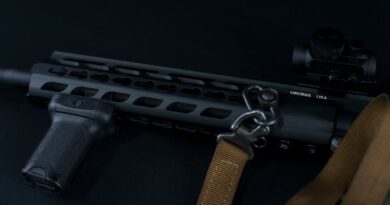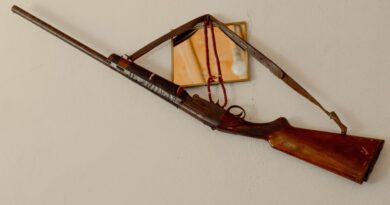How to Choose the Right Firearm for Your Needs
Firearms have been a part of human history for centuries, serving a variety of purposes from hunting and self-defense to sport shooting and law enforcement. With so many options available on the market today, choosing the right firearm for your needs can be a daunting task. Whether you’re a seasoned gun owner looking to add to your collection or a first-time buyer interested in exercising your Second Amendment rights, understanding the key factors to consider when selecting a firearm is essential.
In this comprehensive guide, we will explore the intricacies of choosing the right firearm for your needs. From understanding different types of firearms to considering factors like caliber, ergonomics, and intended use, we will provide you with the knowledge and insights necessary to make an informed decision. So, let’s dive in and discover how you can find the perfect firearm that suits your needs and preferences.
The Importance of Choosing the Right Firearm

When it comes to firearms, one size does not fit all. Selecting the right firearm for your needs is crucial for several reasons. First and foremost, the safety of yourself and others depends on your ability to handle and operate the firearm effectively. A firearm that is too large, too powerful, or too complex for your skill level can pose serious risks. Additionally, having a firearm that is well-suited to your intended use, whether it be self-defense, hunting, or recreational shooting, can enhance your overall shooting experience and performance.
Moreover, choosing the right firearm can also impact your comfort, confidence, and enjoyment when using it. A firearm that feels comfortable in your hands, has manageable recoil, and is easy to operate can make a significant difference in your shooting experience. By taking the time to carefully consider your needs, preferences, and skill level, you can ensure that you select a firearm that is not only safe and effective but also enjoyable to use.
Understanding Different Types of Firearms

Before diving into the specifics of choosing a firearm, it’s important to have a basic understanding of the different types of firearms available on the market. Firearms can generally be categorized into three main types: handguns, rifles, and shotguns. Each type of firearm is designed for specific purposes and has its own set of advantages and limitations.
Handguns
Handguns are the most commonly used type of firearm for self-defense and concealed carry. They are compact, lightweight, and easy to carry, making them ideal for everyday use. Handguns come in two main varieties: pistols and revolvers. Pistols have a semi-automatic action, meaning they automatically chamber a new round after each shot, whereas revolvers have a rotating cylinder that holds multiple rounds.
When choosing a handgun, consider factors such as caliber, grip size, and trigger pull weight. Caliber refers to the size of the bullet the handgun fires, with common calibers including 9mm, .45 ACP, and .380 ACP. Grip size is important for comfort and control, as a handgun that is too large or too small for your hands can be difficult to shoot accurately. Trigger pull weight determines how much force is required to fire the handgun and can affect accuracy and precision.
Rifles
Rifles are long-barreled firearms designed for accuracy and range. They are commonly used for hunting, target shooting, and long-range shooting sports. Rifles come in various action types, including bolt action, semi-automatic, and lever action. Bolt action rifles are known for their accuracy and reliability, while semi-automatic rifles offer faster follow-up shots.
When choosing a rifle, consider factors such as caliber, barrel length, and sighting system. Caliber choice depends on the intended use of the rifle, with common calibers including .223 Remington, .308 Winchester, and .30-06 Springfield. Barrel length can impact accuracy, velocity, and maneuverability, with longer barrels generally providing greater accuracy. The sighting system, which includes iron sights, scopes, and red dot sights, is crucial for aiming and targeting.
Shotguns
Shotguns are firearms that are designed to fire shells containing multiple projectiles, known as shot. They are commonly used for hunting birds, clay shooting sports, and home defense. Shotguns come in various types, including pump action, semi-automatic, and break action. Pump action shotguns are popular for their reliability and simplicity, while semi-automatic shotguns offer faster shooting capabilities.
When choosing a shotgun, consider factors such as gauge, barrel length, and choke type. Shotguns are classified by gauge, with 12 gauge being the most common for sporting and self-defense purposes. Barrel length can impact shot spread and maneuverability, with shorter barrels providing wider shot patterns. The choke type determines the spread of the shot and can be modified to suit different shooting scenarios.
Factors to Consider When Choosing a Firearm

Now that you have a basic understanding of the different types of firearms available, let’s delve into the key factors to consider when choosing the right firearm for your needs. Whether you’re looking for a firearm for self-defense, hunting, or recreational shooting, these factors can help guide your decision-making process.
Intended Use
One of the most important factors to consider when choosing a firearm is your intended use. Are you looking for a firearm for self-defense, hunting, target shooting, or competition? Each type of firearm is designed with specific purposes in mind, so it’s essential to match the firearm to your intended use.
For self-defense, a compact and easily concealable handgun may be the best option. Look for a handgun with a manageable recoil, a high capacity magazine, and a reliable action. For hunting, a rifle or shotgun with an appropriate caliber and barrel length for the game you’re pursuing is crucial. Consider factors such as accuracy, range, and stopping power when selecting a hunting firearm.
For target shooting and competition, a firearm that is accurate, reliable, and comfortable to shoot is essential. Look for a firearm with adjustable sights, a comfortable grip, and a smooth trigger pull to enhance your shooting performance. By considering your intended use upfront, you can narrow down your options and choose a firearm that is well-suited to your needs.
Caliber
Caliber is a critical factor to consider when choosing a firearm, as it determines the size and power of the bullet the firearm fires. Common handgun calibers include 9mm, .45 ACP, and .380 ACP, while common rifle calibers include .223 Remington, .308 Winchester, and .30-06 Springfield. Shotguns are classified by gauge, with 12 gauge being the most prevalent.
When selecting a caliber, consider factors such as recoil, stopping power, and ammunition availability. A smaller caliber handgun may have less recoil but may lack stopping power, while a larger caliber handgun may have more recoil but greater stopping power. Consider your ability to manage recoil and shoot accurately when choosing a caliber that is right for you.
Ergonomics
Ergonomics refers to the design and comfort of a firearm in relation to the shooter’s body. A firearm with good ergonomics will fit comfortably in your hands, allowing for a secure grip and natural pointing. Consider factors such as grip size, trigger reach, and overall balance when evaluating the ergonomics of a firearm.
When selecting a firearm, test out different models to see how they feel in your hands. Pay attention to the grip size and texture, as well as the trigger reach and weight. A firearm that feels comfortable and natural to hold will be easier to shoot accurately and effectively. Additionally, consider factors such as the placement of controls, the weight distribution, and the overall balance of the firearm.
Reliability
Reliability is a crucial factor to consider when choosing a firearm, especially for self-defense or duty use. A reliable firearm should feed, fire, and eject ammunition consistently without malfunctions or stoppages. Look for firearms from reputable manufacturers known for their quality and reliability.
When evaluating the reliability of a firearm, consider factors such as the action type, the quality of materials and craftsmanship, and the manufacturer’s reputation. Semi-automatic firearms are known for their reliability and ease of use, while revolvers are prized for their simplicity and ruggedness. Research reviews, ratings, and recommendations from trusted sources to ensure that the firearm you choose is reliable and dependable.
Budget
Another important factor to consider when choosing a firearm is your budget. Firearms can vary widely in price, with different models, brands, and calibers available at different price points. Set a budget based on your financial situation and stick to it when shopping for a firearm.
When considering your budget, factor in not only the cost of the firearm itself but also any additional accessories, ammunition, and training you may need. Remember that investing in high-quality firearms and accessories can pay off in the long run in terms of performance, reliability, and durability. Look for firearms that offer the best value for your budget, balancing quality and affordability.
Training and Education
Finally, one of the most critical factors to consider when choosing a firearm is your level of training and education. Owning and using a firearm responsibly requires knowledge, skills, and practice. Seek out training courses, safety classes, and shooting instruction to enhance your proficiency and confidence with firearms.
When selecting a firearm, consider factors such as ease of operation, safety features, and training requirements. Choose a firearm that you feel comfortable handling and operating, taking into account factors such as manual safeties, magazine capacity, and sight alignment. The more knowledgeable and skilled you are with your firearm, the safer and more effective you will be in using it.
Expert Opinions

According to firearms experts, the most crucial factor to consider when choosing a firearm is your level of comfort and confidence with the firearm. Firearms should feel natural and easy to handle, allowing you to shoot accurately and effectively. Seek out expert advice and guidance when selecting a firearm to ensure that it meets your needs and preferences.
Firearms instructors emphasize the importance of training and practice in using a firearm safely and responsibly. Regular practice at the range, participation in shooting sports, and ongoing education can enhance your shooting skills and confidence with firearms. Remember that owning a firearm is a serious responsibility that requires knowledge, skill, and respect.
Conclusion
Choosing the right firearm for your needs is a decision that should not be taken lightly. By considering factors such as intended use, caliber, ergonomics, reliability, budget, and training, you can select a firearm that is safe, effective, and enjoyable to use. Whether you’re a seasoned gun owner or a first-time buyer, the process of choosing a firearm requires careful thought, research, and consideration.
Remember that owning and using a firearm is a serious responsibility that requires knowledge, skill, and respect. Seek out training and education, practice regularly, and prioritize safety when handling firearms. By taking the time to choose the right firearm for your needs, you can ensure that you have a reliable and effective tool for self-defense, hunting, or recreational shooting.
So, whether you’re looking for a compact handgun for concealed carry, a precision rifle for long-range shooting, or a versatile shotgun for hunting, consider your needs, preferences, and skill level when choosing a firearm. With the right knowledge and guidance, you can find the perfect firearm that suits your needs and enhances your shooting experience.




